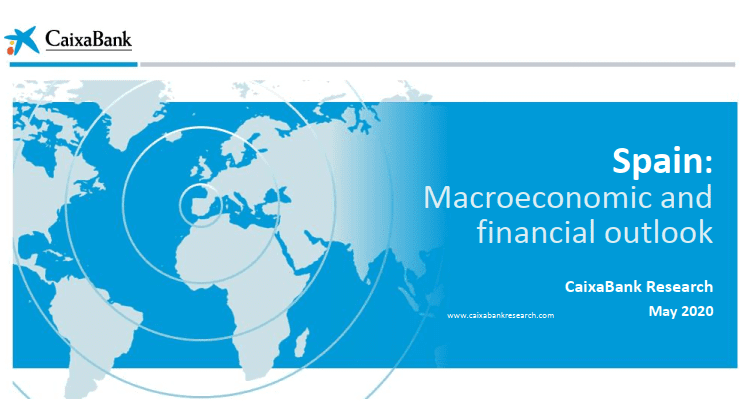7 May 2020
CaixaBank Research has recently released its May Report with some interesting insights on how the Spanish economy is dealing with the current COVID-19 crisis, as well as some forecasts in the medium term.
Main messages
1- The Spanish economy will sink into a severe recession due to COVID-19:
- The COVID-19 shock will lead to a sharp downturn. Major lockdown measures were activated on March 14 but as of April 26 some have very gradually been reduced.
- Our scenario forecasts that the impact on activity will be most acute during the first semester of this year, with the economy returning gradually to normality (GDP growth: -7.2% in 2020 and +6.9% in 2021).
- Nevertheless, the uncertainty surrounding the scenario is very high as its heavily dependent on the virus’ evolution, lockdown measures and the effectiveness of policies undertaken. If lockdown measures are lifted more gradually the impact could be more persistent (GDP collapse below 10%). Tourism is the sector most affected due to the higher persistence of the shock. The real estate sector is experiencing a sharp contraction, but its solid fundamentals are a plus this time.
- The Spanish banking sector is in good shape to face the crisis and help reduce its impact on the economy by providing liquidity to companies and offering debt moratoriums to the most vulnerable households.
2- Strong response to counteract the economic impact of COVID-19:
- On the political front, the government has adopted a comprehensive policy response to ensure that confinement and activity restriction measures do not end up having persistent effects on employment and activity. The measures go in the right direction, but further action is warranted.
- The measures taken seek to provide liquidity to all actors in the economy to prevent their financial stress mounting (public loan guarantee scheme of €100bn).
- Measures to facilitate temporary job adjustments (ERTEs) will also help companies viability and reduce job destruction.
- The impact on public accounts will be sizeable this year (public deficit of around 10% in 2020). Ambitious measures are necessary to cushion the economic impact and spur a rapid economic recovery.
- The banking sector will have to deal with a notable increase in NPLs (and provisions), and a decrease in net incomes due to the lower credit demand (except corporations) and the decline in interest rates.
3- Solid economic fundamentals are key for a swift recovery:
- Over 5 years of continuous growth without increasing economic imbalances.
- Structural reforms and substantial competitiveness gains have promoted a boost of the export sector.
- Dynamic employment creation (around 3 million jobs created btw 2013-2019) and moderate wage increases (+2.3% in 2019) prior to the health crisis.
- Solid financial position on the private sector side after a substantial reduction of indebtedness.
- More sustainable growth of the real estate sector, aligned with structural housing demand.
- Spain exited the EU excessive deficit procedure, and its public deficit remained below the 3% threshold in 2019.
- The banking sector remains a support factor to Spanish economic growth.
The global economy will sink into a recession due to the COVID-19
1- Lockdowns trigger a global recession:
- The COVID-19 represents a major global shock, which will push the world into recession due to lockdowns. Activity will recover as containment measures get lifted, but the return to normalcy will be gradual.
- Policies will ‘keep the lights on’. The main international economies are taking bold steps to prevent a lasting recession (support for displaced workers, production disruptions and liquidity needs).
- Risks are tilted to the downside: longer lockdowns, policy ineffectiveness, EM fragilities, financial stress.
2- Central banks have responded boldly to the COVID-19:
- Central banks launched liquidity and credit facilities and anchored a low-rates environment.
- The Fed cut rates to 0.00%-0.25% (-150bp), announced unlimited purchases of Treasuries and MBS, and launched several credit and liquidity facilities (incl. corporate debt purchases and backing consumer-credit-backed assets).
- The ECB kept rates at historical lows, increased the appeal and amount of liquidity injections (TLTROIII, LTRO and PELTRO), and massively raised asset purchases (+870bn in 2020, ≈7% of GDP).
3- Financial markets operate in a risk-off environment:
- Risk aversion and aggressive monetary policy will keep AEs sovereign yields at low levels in spite of the global fiscal expansion. As uncertainties surrounding the economic outlook recede, yields could nudge up. Risk aversion will take a toll on low-quality assets.
- Financial markets will exhibit renewed bouts of volatility reflecting investors’ sensitivity to the pandemic’s dynamics and policy announcements.
*If you’d like to receive the whole report, please contact La Camara.
Learn more about CaixaBank Research.
